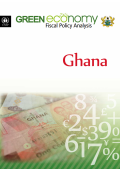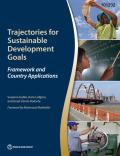

In September 2015, the United Nations General Assembly adopted the 2030 Agenda for Sustainable Development and now individual countries face the challenge of implementing strategies that help realize the ambitions of this agenda, embodied in the Sustainable Development Goals (SDGs).
This book presents a Country Development Diagnostics Post-2015 framework, designed to assess country-level implications of the 2030 Agenda for Sustainable Development, and applications of the framework to ten countries. The framework helps policy makers identify policies that may accelerate progress on the SDGs, and analyze sources of fiscal space to finance additional spending. Current levels of SDGs and their determinants are benchmarked on the basis of country per capita income, making it possible to compare the focus country to other countries. On the basis of current prospects for income growth, the framework also projects likely SDG outcomes for 2030 in the absence of accelerated progress.
In support of its ambitious target to reduce CO2 emissions the Scottish Government is aiming to have the equivalent of 100% of Scottish electricity consumption generated from renewable sources by 2020. This is, at least in part, motivated by an expectation of subsequent employment growth in low carbon and renewable energy technologies; however there is no official data source to track employment in these areas. This has led to a variety of definitions, methodologies and alternative estimates being produced.
Climate change creates two types of potential risks for financial institutions: physical climate risks leading to physical damage to assets, and carbon risks altering the financial viability of a part of the capital stock and business models.
This report looks at how to integrate these two risks into financial risk and valuation models and it shows that there are no fundamental barriers to this integration. In addition, it underlines that addressing this challenge requires not just a focus on the models but also risk management practices.
Raw materials are essential for the global economy and future development depends on their continued supply. In general, their deposits in the Earth’s crust are also geographically clustered, making security of supply a potential risk. In many cases, the exhaustion of economically competitive minerals deposits in industrialized countries has made supplies increasingly dependent on the political stability of mineral-rich emerging economies. At the same time, increasing demand from these emerging markets, new technologies that require large amounts of rare minerals , low substitutability in applications and low rates of recycling have made economies more vulnerable to potential supply disruptions.
